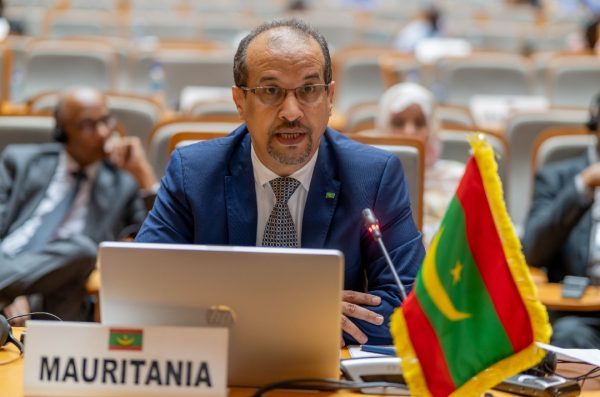On 26 and 28 October 2022, the African Commission reviewed the periodic report of the Islamic Republic of Mauritania covering the period 2018-2021 during its 73rd Ordinary Session. The Mauritanian delegation was composed of Cheikh Ahmedou Sidi, Commissioner for Human Rights, Humanitarian Action and Relations with Civil Society, who was accompanied by Harouna Traoré, Head of Mission at the Presidency of the Republic, Mohamed Ould Ali Telmoudi, Advisor to the Prime Minister, in charge of Human Rights.
Ahead of the 73rd ordinary session of the African Commission, ISHR along with Minority Rights Group International, SOS-Esclaves, Association des Femmes Chefs de Famille (AFCF), and Anti-Slavery International submitted a civil society report for the review of Mauritania on the situation of human rights defenders.
The briefing paper called on the government to:
- Respect the right of individuals and civil society organisations to freedom of expression and freedom of assembly and honor the commitments made in the Roadmap to eradicate slavery to support the work of civil society;
- Put an end to all forms of intimidation and reprisals against human rights defenders who cooperate with the African human rights system;
- Facilitate access to Mauritania for representatives of human rights NGOs;
- Adopt and implement a legal framework that guarantees an enabling environment for human rights defenders and the protection and promotion of their rights;
- Put an end to arbitrary arrests and detentions of human rights defenders and bloggers;
- Amend and repeal provisions and laws that restrict the rights to freedom of association, expression and peaceful assembly, in particular the Criminal Code, the Cybercrime Act of 2016 and the Anti-Terrorism Act of 2010.
The Delegation of Mauritania seized the opportunity to highlight some positive steps taken by the government to protect the rights of its citizens through the adoption of law No. 2018-023 of 21 June 2018 criminalising discrimination, which domesticates the provisions of the Convention on the Elimination of All Forms of Racial Discrimination and law No. 2015-031 of 10 September 2015, criminalising slavery and punishing slavery-like practices.
During the review, all commissioners welcomed the submission of the periodic report of the government of Mauritania. In addition, the Commissioners further emphasised that the report of the Islamic Republic of Mauritania did not follow the Commission’s guidelines and procedures for State reporting. The government did not deliver a report covering the three instruments, including article 26 of the Maputo Protocol and article 14 of the Kampala Convention, and instead delivered a report that only covered the African Charter.
Country Rapporteur of Mauritania, Commissioner Maya Sahli-Fadel welcomed the report and the efforts made in the country. “Does Mauritania plan to deposit the declaration of competency on the recognition of the African Court of Justice for citizens and civil society organisations to access the court?” Commissioner Sahli-Fadel asked. She noted that the report does not cover the period 2014-2017 and does not mention the measures taken during the Covid-19 period.
Regarding freedom of expression and information access, Commissioner Litha Musyimi-Ogana highlighted her concern over the increase in online hate speeches. “Were there any actions taken to ensure that the citizens of Mauritania have the ability to easily access the internet?” she asked.
The Special Rapporteur on human rights defenders and Chairperson of the African Commission, Commissioner Rémy Ngoy Lumbu requested Mauritania to share more information on the specific situation of human rights defenders in the country as well as the steps in place to implement the guidelines on FOAA. “Is freedom of assembly protected within the Mauritanian Constitution? Does Mauritania plan to adopt a law on the protection of defenders with a focus on defenders working on women’s rights? Beyond that, what measures have been taken to support women human rights defenders ?” Commissioner Lumbu asked.
To conclude the review, the Chief of the delegation of Mauritania stressed that the 100,000 alleged cases of slavery have nothing to do with the reality on the ground and Mauritania remains open to any country visit by mechanisms of the African Commission.
Download as PDF




